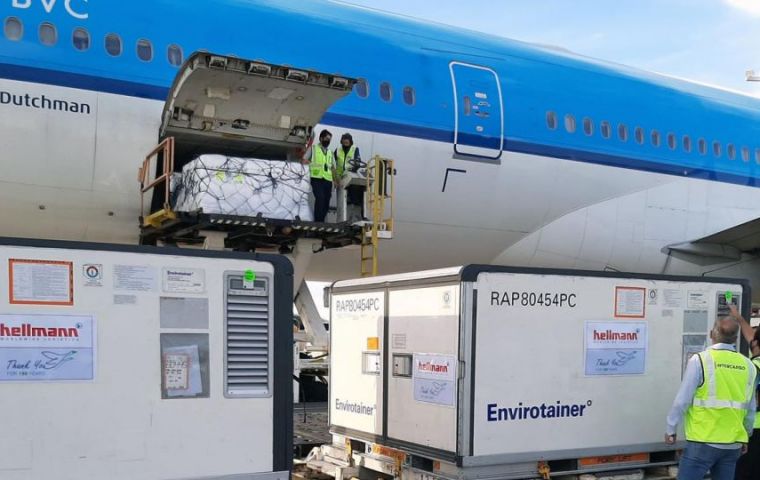MercoPress. South Atlantic News Agency
Argentina to receive over 800,000 doses of AstraZeneca; Denmark stop giving that vaccine
 Argentina has also signed a deal for two million Sinopharm doses, said Vizzotti
Argentina has also signed a deal for two million Sinopharm doses, said Vizzotti The Argentine government has announced a shipment of 864,000 doses of the AstraZeneca anti-covid-19 vaccine is due at Buenos Aires' Ezeiza airport onboard a KLM flight this coming Sunday morning.
The new batch is a part of the Global Access Fund for Covid-19 Vaccines (known as the Covax mechanism for its acronym in English). The Covax mechanism was promoted by the World Health Organization, the European Commission and France to guarantee equitable access to a vaccine for all countries, in an agreement that was signed by 172 nations, including Argentina.
Meanwhile, Denmark will stop administering the AstraZeneca immunizer because of its possible link to rare cases of blood clotting, although Danish health authorities insisted that the shot's benefits outweighed the risks. With the Covid-19 epidemic in Denmark under control and other vaccines available, it was decided to discontinue the use of the AZ product.
Argentina has deepened Wednesday its restrictive measures on people in an attempt to curb the spread of the coronavirus responsible for the disease.
In this context, Health Minister Carla Vizzotti and Presidential Advisor Cecilia Nicolini met earlier this week with India's Ambassador Dinesh Bhatia to discuss additional supplies from the vaccines produced in that country. The Argentina officials also held talks with China's Ambassador Zou Xiaoli regarding the purchase of Sinopharm shots.
“Argentina has signed a contract with China for which we have two million doses of Sinopharm pending delivery, while with India we have different strategic lines of access possibilities that we are trying to deepen and specify, although we do not have signed any contracts yet,” said Vizzotti.
For its part, Uruguay received 48,000 doses of the AstraZeneca vaccine on 4 April and they will be sent to border departments with Brazil and to areas where there is a lower proportion of vaccinated people, Public Health Minister Daniel Salinas said on his Twitter account.
But Danish Health Authority Director-General Søren Brostrøm said in a statement that: “Based on the scientific findings, our overall assessment is there is a real risk of severe side effects associated with using the COVID-19 vaccine from AstraZeneca.”
“We have, therefore, decided to remove the vaccine from our vaccination [program],” he added




Top Comments
Disclaimer & comment rulesCommenting for this story is now closed.
If you have a Facebook account, become a fan and comment on our Facebook Page!